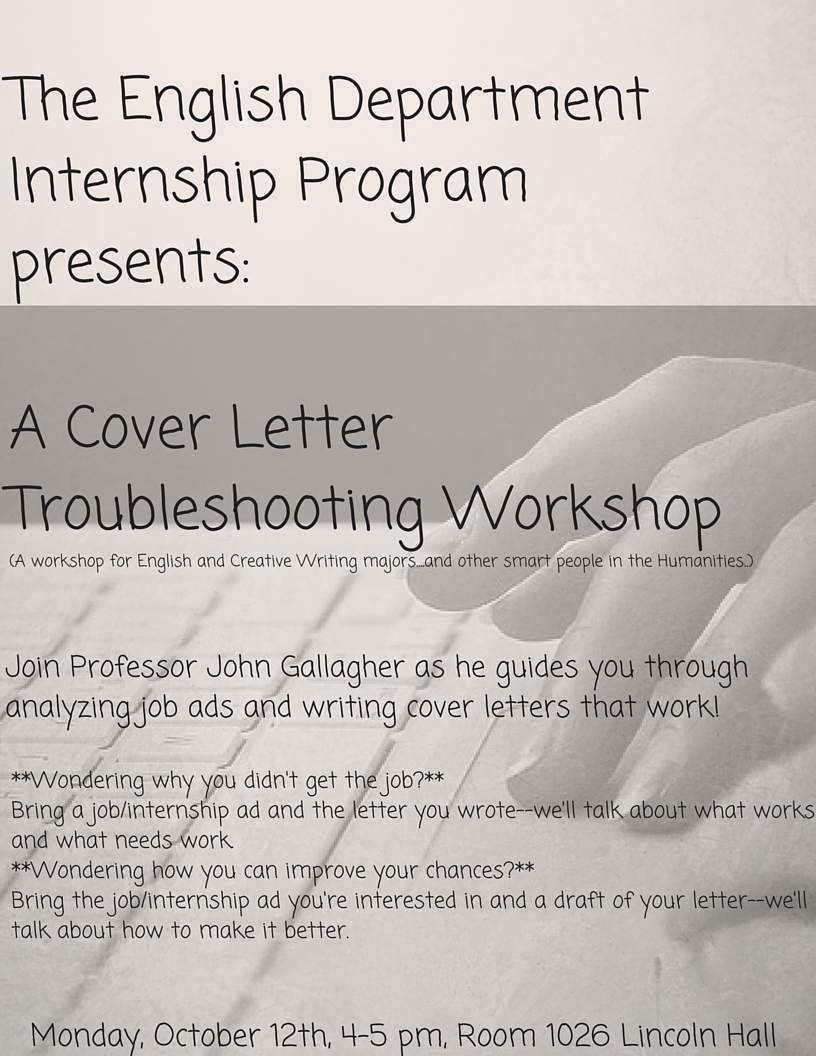Should You Write for Free?
 A lot of online publications are looking for writers. Just this week, there have been a couple of links on our Facebook page: The Artifice and Impulse (edited by English major Alyssa Rege!). Other publications haven’t yet made a pitch for English department writers this semester, but they have in the past and may do so again: Spoon University, Her Campus, Black Sheep. None of them pay for articles. Some of them offer opportunities to edit if writers stay with the publication, and sometimes those people get paid.
A lot of online publications are looking for writers. Just this week, there have been a couple of links on our Facebook page: The Artifice and Impulse (edited by English major Alyssa Rege!). Other publications haven’t yet made a pitch for English department writers this semester, but they have in the past and may do so again: Spoon University, Her Campus, Black Sheep. None of them pay for articles. Some of them offer opportunities to edit if writers stay with the publication, and sometimes those people get paid.
Here are some reasons to write for free:
- You can develop writing samples (often requested by employers looking to hire creative talent).
- It’s fun.
- Writing about something you care about for an audience will develop your voice.
- You can gain the skills and experience you need to get paid to write.
Here are some reasons not to write for free:
- It can take time away from paid employment or other career-building activities.
- It’s not fun.
- Your writing is worth something.
- These publications only flourish because people are willing to write for free.
Here are some questions to ask yourself before you make a commitment to writing for free:
Would a byline there make you look appealing to the organizations you would like to work for eventually? The answer to this question isn’t always obvious. If your goal is a high-end PR firm, the link to a Black Sheep article might not help you much; if you want to break into screenwriting or entertainment, it’s a rare opportunity to showcase your cutting-edge vulgarity,
Will it be fun? If you like it–and it gives you the same entertainment value as other things you do for fun–then why not? If you have things to say, it’s good to have a way to say them.
Will it take time away from other things you could be doing to get professional experience?
Do you have good reasons for writing-for-free for an online publication, rather than a print one? The Daily Illini, Buzz, Public I, and other campus and community publications are also looking for writers and can supply you with the immediacy of an office and a real-life staff. One is not necessarily better than the other, but it’s a good idea to reflect on what you plan to gain from the experience and why the online publication seems like the best way to gain it.
Will you get editorial support and supervision to help you grow as a writer? Some publications will publish anything, others are cultivating a brand and subject writers to a great deal of oversight. For writers, there are advantages to both approaches–it just depends on what you want to gain from the experience.
Do you have a plan for transitioning from writing for free to writing for money? If you’re doing it to gain professional experience (rather than for the fun of it), then you should set a goal to mark where “writing to gain experience” ends and “getting exploited” begins: a time limit, a number of articles, a next step (e.g., an editorship on the publication or a part-time job or internship that uses your writing skills).
Some additional resources to help you understand the economics of writing in the internet age:
Writing for Free (The Atlantic Monthly)
When Should a Young Writer Write for Free? (Salon Magazine)
Writing for Free on the Internet is an Enormous Boon to Society (Slate)
Writing for Free: Part II (Slate)

